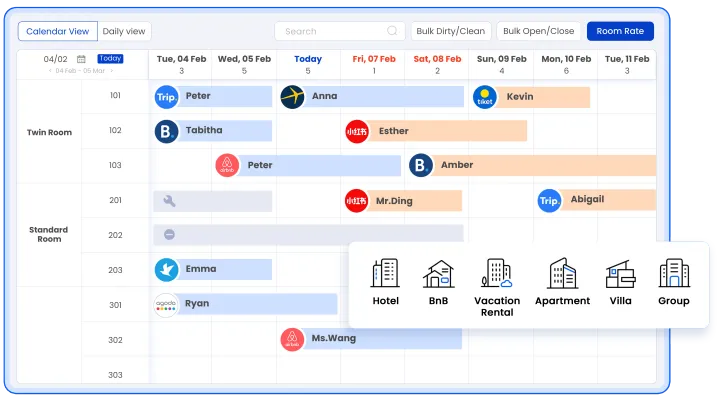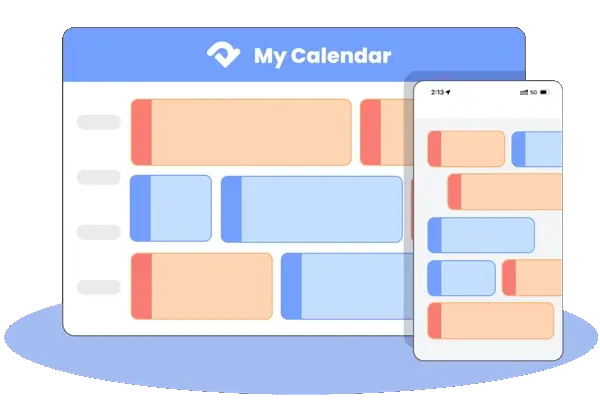Running a hotel involves managing countless moving parts—from guest reservations and room allocations to payment solutions and channel management. Technology has become the core of effective hotel operations as hospitality continues to evolve. And at the center of this technological revolution is the hotel PMS( hotel property management system).
This complete information explores the core elements of PMS, why it is necessary in the hospitality industry, its features, advantages, and future trends. Whether you are a hotel owner, supervisor, or those about to enter the hospitality industry, appreciating hotel PMS is critical to accomplishing operational excellence and ideal visitor satisfaction.
What is Property Management System in Hotel?
A hotel property management system (PMS) is a software solution designed to facilitate the management of a hotel's core operations. Previously, traditional systems focused on front desk tasks such as check-in and check-out. However, with the current digital transformation, modern hotel PMS systems have evolved into all-in-one platforms that cover a wide range of functions.
In short, a hotel PMS is the digital control center of a hotel. It integrates multiple operational components such as reservation management, price and room inventory management, front desk operations, room service, OTA management, payment solutions, and more. By streamlining these processes, hotels can focus more on delivering exceptional service.
A typical hotel PMS offers the following base modules:
- Room reservations and allocation management
- Front-desk operations
- Housekeeping coordination
- Guest profile tracking
- Reporting & analytics
- Channel management
With the growing demand for mobility and cloud capabilities, many businesses are now opting for mobile-enabled hotel PMS or cloud-based hotel PMS to enhance flexibility and scalability.
Why is PMS Important in the Hospitality Industry?
The hospitality industry is highly dynamic, with constant fluctuations in guest preferences, competitive pricing strategies, and global booking sources. In this environment, it goes without saying the importance of hotel PMS in the hotel industry, enhancing team coordination, and improving the guest journey.
1. Operational Efficiency
Hotel PMS software automates repetitive tasks like assigning rooms, mastering multi-channel messaging, and updating room statuses. This reduces the workload on staff, minimizes errors, and ensures that all departments stay synchronized.
2. Centralized Information Management
A hotel PMS system stores all guest data, reservation details, billing history, and staff logs in a centralized database. This eliminates data silos, ensuring seamless communication between departments.
3. Enhanced Guest Experience
Modern hotel PMS platforms support personalized services, from pre-arrival communications to post-checkout feedback. Integrating with CRMs and messaging apps enables hotels to delight guests with tailored experiences.
4. Revenue Optimization
With features like dynamic pricing, occupancy forecasting, and channel management, hotel PMS solutions help hotels optimize room rates based on market trends. This directly impacts occupancy rates and profit margins.
5. Compliance and Security
A reliable hotel PMS helps maintain PCI compliance and secures guest data through encrypted transactions and access control, thereby building trust and protecting the brand.
Features of a Hotel Property Management System
The best hotel PMS platforms offer a wide array of features designed to address every operational aspect of a hotel business. These features not only improve daily workflows but also enhance long-term strategic planning.
1. Centralized Calendar Dashboard
The centralized calendar in the hotel PMS offers an intuitive, real-time overview of all reservations, including arrivals, departures, room assignments, and housekeeping schedules. This dynamic interface enables front desk staff to manage bookings more efficiently, minimize human error, and prevent overbooking or scheduling conflicts.
2. Channel Manager
A hotel PMS typically includes a built-in channel management module that automatically syncs room availability, rates, and restrictions across multiple online travel agencies (OTAs) such as Agoda, Airbnb, Tiket.com, and Trip.com. This feature in hotel PMS systems ensures real-time sync across OTAs, a key advantage of a reliable PMS system. This real-time synchronization eliminates the need for manual updates, reduces the risk of double bookings, and ensures consistent pricing across all platforms.
3. Direct Booking Engine
A built-in booking engine within the PMS allows hotels to accept direct, commission-free reservations through their own website. It synchronizes in real-time with room availability, pricing, and booking data, helping to prevent overbooking and rate inconsistencies. Guests can view detailed room descriptions, amenities, and policies, and complete secure online payments using various methods such as credit cards or local gateways. All bookings made through the website are instantly reflected in the front desk system, improving efficiency and enhancing the guest booking experience.
4. Mobile App Operation
A mobile-enabled PMS lets guests check in and out using their smartphones, saving time and avoiding front desk queues. For hotels, this reduces staff workload, speeds up operations, and keeps guest information updated in real-time, all contributing to a smoother, more efficient stay experience.
5. Payment Processing
An integrated payment gateway within the PMS ensures secure, fast, and PCI-compliant transactions. It supports various payment methods including credit cards, mobile payments, and digital wallets.
6. Housekeeping Management
Housekeeping staff can update room cleaning statuses in real-time using mobile devices. This streamlines room readiness communication with the front desk and helps prioritize urgent tasks.
7. Guest Communication Tools
Automated messaging tools within the PMS send timely notifications to guests—reminders, upselling offers, and feedback requests—helping to boost engagement. Of course, instant messaging and guest booking details from different platforms are integrated into the PMS.
8. Performance Reporting and Business Intelligence
Advanced hotel PMS platforms include robust reporting tools for monitoring:
- Occupancy rate
- Average Daily Rate (ADR)
- Revenue per Available Room (RevPAR)
- Booking source performance
Such business intelligence in hotels empowers managers to make data-driven decisions for pricing, staffing, and marketing.
Advantages of PMS in Hotel
The benefits of adopting a right PMS for hotel go far beyond digital convenience. The right PMS can revolutionize how your property functions and how guests perceive your service.
1. Increased Productivity
Automating routine tasks helps employees focus on delivering personalized experiences rather than being bogged down by administrative chores.
2. Better Guest Satisfaction
Personalized communication, fast service, and fewer operational hiccups translate into a better guest journey, from booking to checkout.
3. Real-Time Visibility and Control
Managers can monitor property operations remotely via cloud-based dashboards. Instant access to reports and real-time updates ensures better control.
4. Cost Reduction
With streamlined processes, better inventory management, and improved staff efficiency, hotels can significantly cut down on operating costs.
5. Scalable and Customizable
Modern top hotel pms systems solutions grow with your business. Whether you run a boutique hotel or a multi-property chain, features can be added or scaled according to needs.
6. Seamless Integration with Other Systems
A key advantage of using a modern PMS is its ability to integrate with:
- Point of Sale (POS)
- Revenue Management Systems (RMS)
- CRMs
- Payment processors
- Marketing platforms
These property management system integrations reduce redundancy and create a unified tech ecosystem.
How to Choose the Right PMS for Your Hotel
Choosing the best hotel PMS requires careful evaluation of your operational needs, guest expectations, and business goals. Here are the key factors to consider:
1. User-Friendliness
Opt for a system with an intuitive interface that requires minimal training for your staff. A user-friendly design enhances adoption and reduces onboarding time.
2. Cloud-Based vs. On-Premise
Cloud-based hotel PMS platforms offer greater flexibility, automatic updates, and lower upfront costs. On-premise systems may offer more control but are costlier to maintain.
3. Scalability
Select a PMS that can grow with your business. Features should be modular, allowing you to add more capabilities as your needs evolve.
4. Integration Capabilities
Ensure your chosen PMS can integrate smoothly with third-party applications like OTA channels, CRMs, and accounting tools. Seamless property management system integrations are essential for a unified workflow.
5. Mobile Accessibility
A mobile-enabled hotel PMS enables remote monitoring and quick updates, enhancing responsiveness and staff productivity.
6. Reporting and Analytics
Look for PMS software that includes powerful reporting features and business intelligence in hotels. These tools are vital for performance tracking and strategic planning.
7. Support and Training
Choose a vendor that offers comprehensive support, onboarding assistance, and regular software updates. Quality customer service can prevent disruptions and reduce frustration.
8. Cost and Value
Evaluate the long-term ROI. Don’t just focus on the subscription fee; consider the system’s impact on efficiency, guest satisfaction, and revenue growth.
The Future of Hotel PMS: Integration and Innovation
As technology continues to reshape the hospitality landscape, the role of the hotel PMS is becoming more advanced and interconnected. Here’s what the future holds:
1. Deeper System Integration
Future hotel PMS platforms will feature even deeper integration with third-party services, ranging from AI-powered chatbots to automated marketing tools. This creates a more cohesive and automated hotel tech stack.
2. AI and Predictive Analytics
Artificial intelligence and machine learning will enhance business intelligence in hotels, enabling predictive demand forecasting, dynamic pricing adjustments, and personalized marketing campaigns.
3. Voice and Chat Interfaces
Smart assistants, chatbots, and voice interfaces will be integrated into PMS platforms, providing both staff and guests with hands-free, intuitive ways to interact with hotel systems.
4. Personalization at Scale
With richer guest profiles and behavioral data, future hotel PMS software will enable hyper-personalized experiences—preferred room types, food preferences, special offers—at scale.
5. Sustainability Integrations
As eco-conscious travel grows, PMS systems will incorporate features to monitor and reduce resource usage, such as automated energy-saving settings for unoccupied rooms.
6. Blockchain and Enhanced Security
To ensure data integrity and transparency in transactions, some hotel PMS platforms may begin to utilize blockchain technology for secure guest verification and payment processing.
7. Universal Guest Portals
Guests will gain more control through universal portals powered by PMS integrations, where they can manage their entire stay: from bookings, payments, room selection, to in-stay requests.
Conclusion
In today’s competitive hospitality environment, adopting the proper hotel PMS is no longer optional—it’s essential. A present-day all-in-one property management system acts as the nerve center of your operations, streamlining processes, enhancing guest satisfaction, and driving growth.
Whether you are working in a boutique motel or a multi-location hotel group, investing in the proper hotel PMS system can seriously change your business. With non-stop innovation, seamless property management system integrations, and developing demand for mobile-first experiences, the future of hotel PMS is bright—and deeply built-in with your hotel’s success.
Understanding what a hotel PMS is and leveraging its full potential is the first step toward running a smarter, more efficient, and guest-centric hotel.

